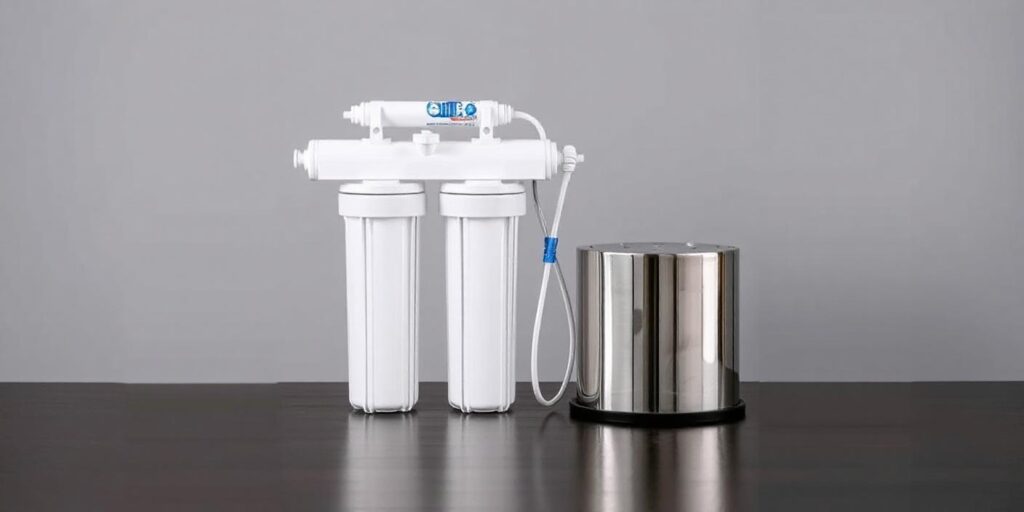Introduction to the Importance of Clean Water
Is reverse osmosis water the same as filtered water? This is a common question among homeowners and plumbers who prioritize clean, safe water. Clean water is essential not just for hydration but also for cooking, bathing, and cleaning.
Access to high-quality water can significantly impact health and well-being, making it crucial to understand the best methods for obtaining and maintaining it. In this blog, we will explore the differences between reverse osmosis (RO) water and traditionally filtered water, helping you make informed decisions for your home.
Difference Between Reverse Osmosis (RO) and Traditional Filtration
Understanding how reverse osmosis and traditional filtration work is fundamental to appreciating their unique benefits and limitations.
Reverse osmosis involves pushing water through a semi-permeable membrane to remove impurities. This process effectively eliminates contaminants like lead, chlorine, and even some bacteria and viruses.
On the other hand, traditional filtration typically uses activated carbon filters to trap impurities, improving water taste and odor. While traditional filtration can remove many harmful substances, it might not be as thorough as RO in eliminating microscopic contaminants. Both methods have their pros and cons, tailored to different needs and preferences.
The choice between these two methods largely depends on the specific water quality issues you’re facing. If your primary concern is heavy metals and microorganisms, RO might be the better option. However, for general improvement of water taste and smell with fewer contaminants, traditional filtration could suffice.

Health and Environmental Impact
The health implications of using RO versus traditional filtration are significant. RO systems are highly effective in purifying water, and removing up to 99% of contaminants.
This can be particularly beneficial for individuals with compromised immune systems or those living in areas with heavily polluted water sources.
From an environmental perspective, RO systems can be less efficient as they tend to produce wastewater during the filtration process. Traditional filtration, meanwhile, typically generates less waste and can be more eco-friendly.
However, both systems have environmental footprints, including the production and disposal of filters and membranes. Choosing the right system involves considering not just the health benefits but also the long-term environmental impact.
Cost Analysis for Homeowners
When it comes to cost, both RO and traditional filtration systems have distinct financial considerations. RO systems usually require a higher initial investment due to their complex mechanisms and installation needs.
Maintenance costs can also add up, as filters and membranes need regular replacement to ensure optimal performance.
Traditional filtration systems generally have a lower upfront cost. They are easier to install and maintain, making them a more budget-friendly option for many homeowners.
The long-term costs, however, depend on the frequency of filter replacements and water usage.
For homeowners, it’s essential to weigh these costs against the benefits each system provides. Investing in a more expensive RO system might be justified if it significantly improves water quality and health outcomes, whereas traditional filtration might be sufficient and more economical for standard needs.
The Role of Plumbers in Water Quality
Plumbers play a crucial role in ensuring the effectiveness of any water filtration system. Professional installation and maintenance are key to maximizing the performance of both RO and traditional filtration systems.
Plumbers can provide expert advice on the best system for your specific water quality issues, ensuring the installation meets all safety and efficiency standards.
Regular maintenance by a qualified plumber can prevent common issues such as leaks, blockages, and reduced filtration efficiency.
They can also offer insights into the latest advancements in water filtration technology, helping homeowners stay updated and make informed decisions.
Engaging with a professional plumber not only ensures the longevity of your filtration system but also guarantees that your household water remains safe and clean.
Final Thoughts
Choosing between reverse osmosis and traditional filtered water is a significant decision that impacts your home’s water quality.
By understanding the differences, health and environmental impacts, costs, and the role of professional installation and maintenance, homeowners can make informed choices that best suit their needs.
In summary, RO systems offer superior contaminant removal, making them ideal for homes with significant water quality issues. Traditional filtration systems are more cost-effective and environmentally friendly, suitable for general water quality improvement.
Consulting with a professional plumber can further enhance your decision-making process, ensuring you select and maintain the right system for your home.
For those interested in exploring more about water quality solutions, consider booking a consultation with a certified water specialist. They can provide personalized advice and help you find the perfect system to meet your household’s unique needs and preferences.
Remember, clean water is the foundation of healthy living. Investing in the right filtration system today can ensure a healthier tomorrow for you and your family.